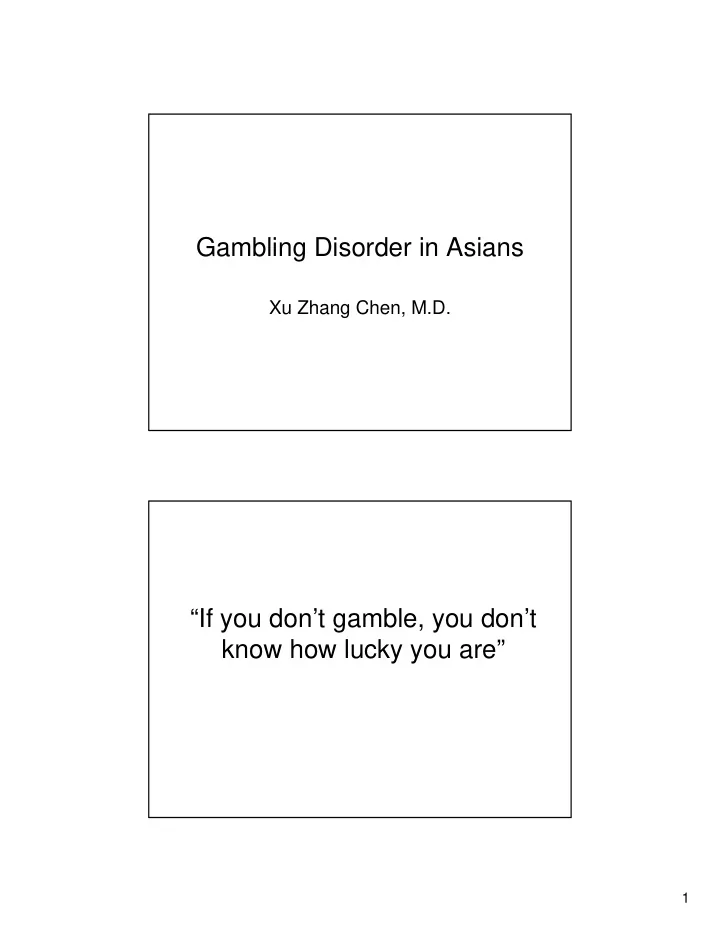

Gambling Disorder in Asians Xu Zhang Chen, M.D. “If you don’t gamble, you don’t know how lucky you are” 1
Why is gambling so popular among Asians? • Gambling disorders 2-3 times more common in Asians (one study showed 60 times greater) • Trauma and social isolation increase risk of gambling disorder • Immigrants are selected “risk takers” – Immigration is a “gamble” Gambling in Asian Culture • Gambling as a routine social activity • Superstition, numerology, and “luck” – Concept of destiny reduces perception of risk • Casino Community – No language barrier when gambling – Marketing targeted at Asians • Stigma – a moral problem 2
Types of gambling in Chinese Community Casino Lottery Mahjong Card clubs OTB (Off track betting) Sports Stock market Gambling is Like a Drug • Euphoria of winning • Repeated euphoria establishes pattern • Anxious, bored, restless, depressed when not gambling • Continued gambling to relieve anxiety • Tolerance through increased amount gambled or frequency • Dependence = Gambling disorder 3
Classification of Gambler Social Gambler 1. Social activity 2. Sometimes, Occasionally 3. Limited money Classification of Gambler Regular Gambler 1. Gambling is seen as a regular entertainment or leisure active 2. Gamble with spare money only and with limited time and betting 4
Classification of Gambler Transitional Gambler 1. Those who has a sudden change in life e.g. lost love, divorce, death of relative, lost job, business, etc. Classification of Gambler Professional Gambler 1. Gambling as a professional, 2. Studying the ways gambling and Probability with high self-discipline 5
DSM-5: Gambling Disorder • Needs to gamble more money to maintain excitement • Restless/irritable when trying to reduce • Repeated attempts to reduce • Preoccupied with gambling • Gambles when depressed • After losing, “chases” losses by gambling again DSM 5: Gambling Disorder • Lies to conceal gambling/losses • Gambling affected family/work • Relies on others for money for gambing • Not due to manic episode • > 3 of the above in 12 months. – Mild (4-5), Moderate (6-7), Severe (>7) • Episodic vs. Persistent 6
Process Winning Phase – Initially social or entertainment – Euphoria of “Winning big money” – Escalation of betting amount (tolerance) – Reinforcement effect, which makes gamblers keep gambling even losing money. Process Losing Phase – Loan, Lying – Neglecting work and family – “chasing” desire of gamble – Pattern affecting personality 7
Process Desperation Phase – Family isolation/conflict – Serious debt, may commit crimes – Depression – No self-reflection, projects blame to others Process Giving up phase – Strong guilt and helplessness – Crimes for money – Defaulting on loans – Suicide or homicide attempts 8
Win Big Money Positive Betting more to experience pay for loans Beneficial Winning attachment phase Irrational thinking Losing phase Development Regular gambler Social Gambling Severe Never gamble gambler Transitional disorder gambling disorder gambler Depressed Key Phase Family/work impairment Negative experience Giving Up phase Desperation phase Chinese Community Problem Gambling Project (SF, Ca) • Early intervention – Gambling problems emerge early (10 y/o) – Change culture of acceptance • Community support – ESL, job training, public benefits, financial counseling • Family support – Involve family, support family – treat family members (MH, domestic violence, etc.) 9
Chinese Community Problem Gambling Project (SF, Ca) • Mental Health – Identify comorbid conditions (e.g. mood, compulsive disorders; PTSD; antisocial personality disorder; substance abuse) – Culturally sensitive MH treatment • “chatting over tea” rather than therapy/counseling • Focus on impact on family rather than gambling behavior • Advocacy – Public education, research, personal repsonsibility Treatment of Gambling Disorder • Fluvoxamine (mean 195 mg/d) • Naltrexone (mean 150 - 200 mg/d) • Lithium • Valproate • Behavioral therapies – Desensitization – Spousal contingency contracting 10
Treatment of Gambling Disorder • Cognitive restructuring – Correct cognitive errors (e.g. that outcome can be controlled/predicted) • Cognitive behavioral therapy – assertiveness, social-skills, problem solving, relaxation – Individual or group • Gamblers Anonymous – 12-step program, no therapist, religion based 11
Recommend
More recommend